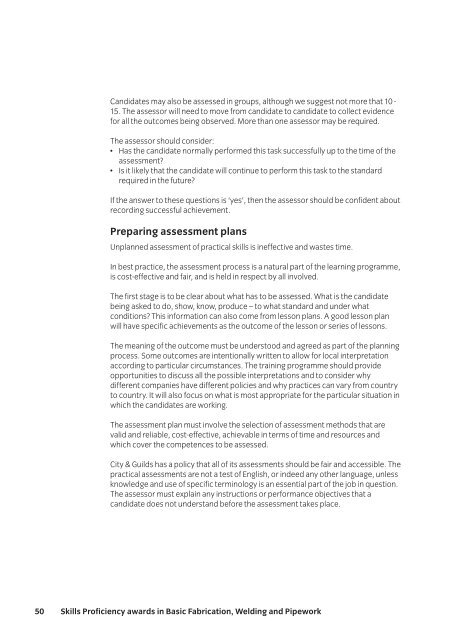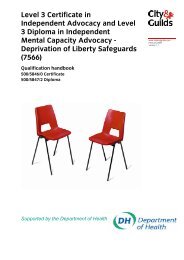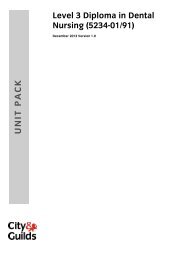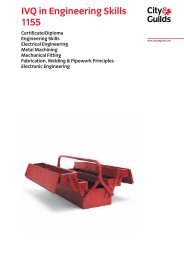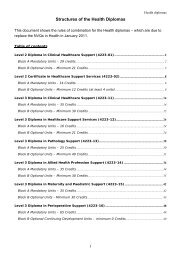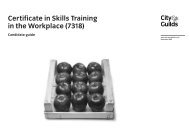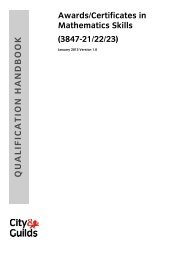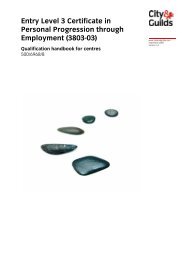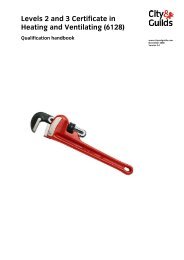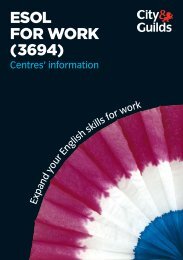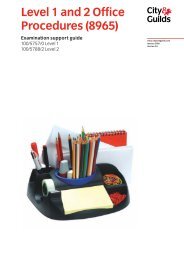Skills Proficiency awards in Basic Fabrication ... - City & Guilds
Skills Proficiency awards in Basic Fabrication ... - City & Guilds
Skills Proficiency awards in Basic Fabrication ... - City & Guilds
Create successful ePaper yourself
Turn your PDF publications into a flip-book with our unique Google optimized e-Paper software.
Candidates may also be assessed <strong>in</strong> groups, although we suggest not more that 10 -<br />
15. The assessor will need to move from candidate to candidate to collect evidence<br />
for all the outcomes be<strong>in</strong>g observed. More than one assessor may be required.<br />
The assessor should consider:<br />
• Has the candidate normally performed this task successfully up to the time of the<br />
assessment?<br />
• Is it likely that the candidate will cont<strong>in</strong>ue to perform this task to the standard<br />
required <strong>in</strong> the future?<br />
If the answer to these questions is ‘yes’, then the assessor should be confident about<br />
record<strong>in</strong>g successful achievement.<br />
Prepar<strong>in</strong>g assessment plans<br />
Unplanned assessment of practical skills is <strong>in</strong>effective and wastes time.<br />
In best practice, the assessment process is a natural part of the learn<strong>in</strong>g programme,<br />
is cost-effective and fair, and is held <strong>in</strong> respect by all <strong>in</strong>volved.<br />
The first stage is to be clear about what has to be assessed. What is the candidate<br />
be<strong>in</strong>g asked to do, show, know, produce – to what standard and under what<br />
conditions? This <strong>in</strong>formation can also come from lesson plans. A good lesson plan<br />
will have specific achievements as the outcome of the lesson or series of lessons.<br />
The mean<strong>in</strong>g of the outcome must be understood and agreed as part of the plann<strong>in</strong>g<br />
process. Some outcomes are <strong>in</strong>tentionally written to allow for local <strong>in</strong>terpretation<br />
accord<strong>in</strong>g to particular circumstances. The tra<strong>in</strong><strong>in</strong>g programme should provide<br />
opportunities to discuss all the possible <strong>in</strong>terpretations and to consider why<br />
different companies have different policies and why practices can vary from country<br />
to country. It will also focus on what is most appropriate for the particular situation <strong>in</strong><br />
which the candidates are work<strong>in</strong>g.<br />
The assessment plan must <strong>in</strong>volve the selection of assessment methods that are<br />
valid and reliable, cost-effective, achievable <strong>in</strong> terms of time and resources and<br />
which cover the competences to be assessed.<br />
<strong>City</strong> & <strong>Guilds</strong> has a policy that all of its assessments should be fair and accessible. The<br />
practical assessments are not a test of English, or <strong>in</strong>deed any other language, unless<br />
knowledge and use of specific term<strong>in</strong>ology is an essential part of the job <strong>in</strong> question.<br />
The assessor must expla<strong>in</strong> any <strong>in</strong>structions or performance objectives that a<br />
candidate does not understand before the assessment takes place.<br />
50 <strong>Skills</strong> <strong>Proficiency</strong> <strong>awards</strong> <strong>in</strong> <strong>Basic</strong> <strong>Fabrication</strong>, Weld<strong>in</strong>g and Pipework


